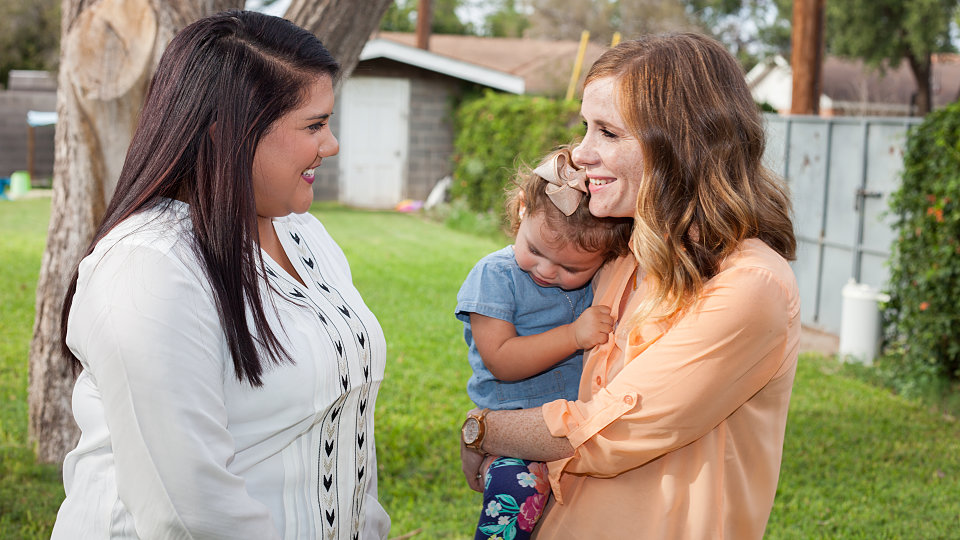Holistic ministry: The relationship between faith and social work
I’m a Christian. And I’m a social worker. Some would even call me a Christian social worker.
For some, that will be hard to reconcile.
At times, the relationship between faith and social work has been as turbulent as some of the families we serve. Christians were at the forefront of developing the modern social work field in the mid-19th century. They were people who responded to a call from God to serve the marginalized in society. Later, people who sought to improve people’s lives out of a sense of moral responsibility joined them and did incredible pioneering work in their own right.
Since then, faith leaders occasionally have decried social work as focusing on physical and emotional issues without address spiritual needs. Secular social workers have accused Christian social workers of attempting to push their faith with those they serve when it really has no impact.
I seek to serve by combining the best of both worlds, using the best-researched methods in partnership with my faith to help hurting people. It’s how I shine hope into the lives of vulnerable families through Buckner Family Pathways, a residential program for single parent families that empowers them to achieve the educational goals.
The best social workers provide holistic ministry. They take inventory of all a person’s needs. Then they work together with the client to address those issues, including physical, emotional and even spiritual needs. To do anything less would be irresponsible.
Recommending a person go through counseling may help with emotional needs, but it won’t fill an empty stomach. A class about proper financial budgeting may help people learn practical skills, but it doesn’t give them a supportive community to help them through hard times like a church can. The people we serve want well-rounded care. They need it.
The model for providing this kind of holistic ministry comes from Jesus Christ himself. Scripture is filled with examples of him meeting people at their points of need – seen and unseen. Jesus repeatedly meets physical needs in addition to spiritual ones. He heals the sick. He feeds the hungry. Of course, he also shares the gospel.
His ministry can be summarized by Matthew 25, somewhat succinctly:
"When the Son of Man comes in his glory, and all the holy angels with him, then he will sit on the throne of His glory. All the nations will be gathered before him, and he will separate them one from another, as a shepherd divides his sheep from the goats. And he will set the sheep on his right hand, but the goats on the left.
"Then the king will say to those on his right hand, ‘Come, you blessed of my father, inherit the kingdom prepared for you from the foundation of the world: For I was hungry and you gave me food; I was thirsty and you gave me drink; I was a stranger and you took me in; I was naked and you clothed me; I was sick and you visited me; I was in prison and you came to me.
"Then the righteous will answer him, saying, 'Lord, when did we see you hungry and feed you, or thirsty and give you drink? When did we see you a stranger and take you in, or naked and clothe you? Or when did we see you sick, or in prison, and come to you?'
"And the king will answer and say to them, 'Assuredly, I say to you, inasmuch as you did it to one of the least of these my brethren, you did it to me.'" (Matthew 25: 31-40)
Following his example, I seek to change lives through serving them. Family Pathways offers financial classes, job skills classes, parenting classes and counseling. We also offer Bible studies and opportunities for prayer. Each offering is informed by the latest research in the field and addresses specific needs and helps people in specific ways.
What people think about faith is part of them. It affects how they view themselves and the world around them. The better I understand them, the better I can help them.
Conversely, my faith is part of me and naturally comes up in daily conversations. I don’t push it on those I serve, but I do talk about it. Faith in some fashion often is part of their lives as well, and typically my clients are excited to talk about theirs.
We’ve found discussion of faith brings the mothers we serve together. It begins breaking down barriers and obstacles that might prevent them from developing as people. When they share with each other, a supportive community forms and they encourage each other toward their goals. Success is celebrated together.
I’ve seen this happen again and again – first in Midland, Texas, and now in Houston and Conroe. Recently, I was struggling to connect with a young mother. She was still suffering after significant trauma throughout her life. Depressed, she was unwilling to listen to advice or take the steps she needed to become the mother she wanted to be.
Then we started talking about faith, church and God. She opened up just enough where she was willing to let us pray for her. That’s a big step. She allowed us into her life. Since then, we’ve had a strong relationship and she’s determined to achieve her goals. She earned her associate’s degree in May and soon will begin work on her bachelor’s degree. She’s an amazing mother and a leader in our community.
That transformation never would have happened if I would have overlooked the spiritual aspects of her life.
Every aspect of a person is important – to them and those who serve them. As social workers, may we meet people’s needs emotionally, physically and spiritually.
Written by Anna Rodriquez, director of the Buckner Family Pathways programs in Houston and Conroe.




Comments